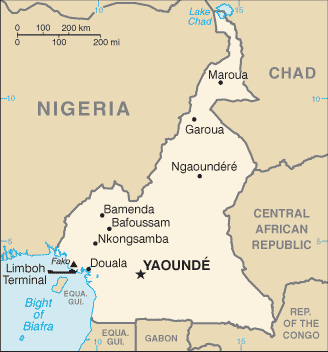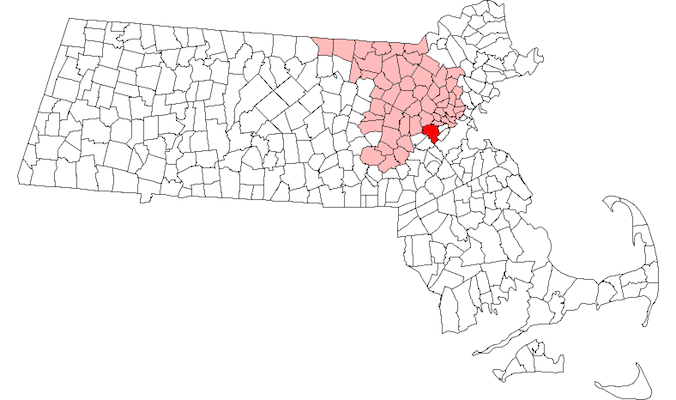In a weird way, it’s inspiring that 90% of presidential candidates have worse basic debating skills than high-schoolers. Like, it shows they aren’t just mindless shills picked for rhetorical abilities, since their rhetorical abilities essentially don’t exist.
US to send military advisers & recon to Cameroon

The Obama administration says it expects to deploy about 300 U.S. service members to the African nation of Cameroon to help stop the spread of Boko Haram and other violent extremist groups.
Roughly 90 U.S. service members are already en route to Cameroon to conduct airborne intelligence, surveillance and reconnaissance operations in the region.
Background from our prior briefing reports:
Cameroon, which is located next to Nigeria (Boko Haram’s home base) and shares a difficult-to-monitor 300-mile border with it, announced it was going to war with Boko Haram back in May of 2014 when hundreds of Nigerian schoolgirls were kidnapped in a raid. This decision triggered a wave of Boko Haram incursions into Cameroon (including high-profile kidnappings) and retaliatory ground and air operations by the Cameroon Armed Forces.
President Paul Biya next month will celebrate his 33rd anniversary as president (after 7 years as prime minister before that). The Cameroonian military (some parts competent and some parts rickety) could probably use the U.S. military assistance, but there will be concerns as to whether the U.S. is again militarily aiding and training a military force in an autocratic African country after more than a few recent instances of political trouble or repression involving U.S.-trained local military forces.
Cameroon — a country once carved out of colonial remainders by Imperial Germany and then split at random by France and Britain before re-merging itself after independence — now finds itself as an unusually stable dictatorship wedged between the rising conflict in northern Nigeria and the aftermath of the recent genocidal civil war in Central African Republic, exposed along lengthy borders on both sides. The populations in northeast Nigeria and northern Cameroon have long had cultural and economic interchange, since the border was an arbitrary colonial one crossing through an existing society.
What did Auchincloss mean by “Millennial Mecca” remark?
Editor’s note: This is more or less a purely local post about politics in Newton MA (where we record our weekly radio show), but it has broader implications for both eastern Mass and other parts of the country where a similar pattern is playing out.

Newton highlighted within Middlesex County, Massachusetts. Credit: Justin H. Petrosek – Wikipedia)
At the Newton Ward 2 At-Large forum, citywide aldermanic candidate Jake Auchincloss said, some 44 minutes in:
“I don’t hear a lot of demand for us becoming a Millennial mecca. […] That’s not where the voters I spoke to chose to live. They chose to live in Newton, which is the Garden City and which has a special comparative advantage in Greater Boston of being bucolic, of having fabulous schools and safe streets, and that’s the priority.”
Maybe other voters won’t hear it the way I did, but: This is, without question, the most troubling (even disturbing, actually) thing I have yet heard from Jake over the course of this campaign.
It would be one thing to contrast Newton in general terms with other slightly more urban communities, some of which he cited by name. But it’s quite another to imply that those communities have bad schools or unsafe streets or no green spaces, and to further imply by specific word choice that this is all because ‘Millennials’ live there in large numbers. As if ‘Millennials’ are destroying the Greater Boston area like locusts and must be kept at bay from Newton.
Can you imagine the blowback if a candidate for citywide office said during a debate that Newton shouldn’t become a “mecca for the elderly” or a “mecca for baby boomers”? He would rightly finish in last place and never be heard from again.
But this discrimination is an easy political move because adult Millennials are not a major voting force in Newton right now for the simple reason that almost none of us can afford to live in Newton. No wonder he didn’t “hear a lot” from young people who have been priced out of their home city. They’re not here to be able to tell him what they want. Read more
Oct 14, 2015 – Arsenal For Democracy Ep. 146
Posted by Bill on behalf of the team.

Topics: How the Reagan Revolution influenced the American Left; the US airstrike on a hospital in Kunduz Afghanistan; Perkins Loans end. People: Bill, Kelley, Nate. Produced: October 11th, 2015.
Episode 146 (54 min):
AFD 146
Discussion Points:
– Generational Politics: How the Reagan Revolution influenced the American Left
– The US blew up a hospital in Afghanistan. What now?
– Why was the Perkins Loan program allowed to expire?
Related Links
– AFD: “Getting trapped in Reagan’s ideological framing”
– France24: “Aid workers killed in US air strike on Afghan hospital”
– AFD by Kelley: “Perkins Loan program expires after 57 year run”
Subscribe
RSS Feed: Arsenal for Democracy Feedburner
iTunes Store Link: “Arsenal for Democracy by Bill Humphrey”
And don’t forget to check out The Digitized Ramblings of an 8-Bit Animal, the video game blog of our announcer, Justin.
Podcast: Play in new window | Download
Subscribe: RSS
AFD Micron #40
With liberty and development for some…
A review finds Massachusetts Gov. Charlie Baker’s economic development council doesn’t reflect the state’s race or gender at all.
“Baker’s economic development panel largely white and male” – The Boston Globe:
But Baker’s 59-member council is more than 85 percent white and more than 80 percent male, according to a Globe review. The lopsided demographics have prompted criticism from those who say that Baker’s personnel decisions have not lived up to his inclusive message on the campaign trail last year.
[…]
But critics such as US Representative Katherine Clark, a Melrose Democrat, said that more than 70 percent of the people entering the workforce are women or people of color, according to research by the Bentley University Center for Women and Business.
[…]
According to US Census Bureau estimates, non-Hispanic whites account for 75 percent of the state’s population, and women for 52 percent.
The EU’s ill-conceived TTIP technocracy strikes again

The Independent: ‘You need to hear what the EU official in charge of TTIP has told me’ (an account from a TTIP opponent):
When put to her, [EU Trade Commissioner] Malmström acknowledged that a trade deal has never inspired such passionate and widespread opposition [as the Transatlantic Trade and Investment Partnership has]. Yet when I asked the trade commissioner how she could continue her persistent promotion of the deal in the face of such massive public opposition, her response came back icy cold: “I do not take my mandate from the European people.”
So who does Cecilia Malmström take her mandate from? Officially, EU commissioners are supposed to follow the elected governments of Europe. Yet the European Commission is carrying on the TTIP negotiations behind closed doors without the proper involvement European governments, let alone MPs or members of the public. British civil servants have admitted to us that they have been kept in the dark throughout the TTIP talks, and that this makes their job impossible.
Not all of the European public’s concerns and trust issues on the negotiations are unwarranted just because a few of them are paranoid. Whether or not TTIP is a good idea (personally I think not), European officials need to take those concerns more seriously — particularly as any deal will have to be ratified by an increasingly jittery 28 national parliaments facing hostile publics more directly.
Previously from AFD on this topic:
– “Drawbacks of Technocracy, Part 1: Europe’s Political Crisis”
– “The Economist on technocracy in democracies”




